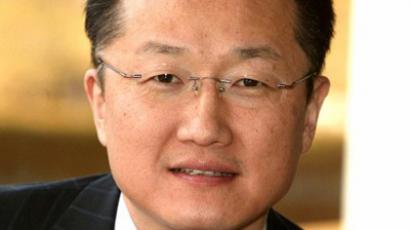‘Arab Spring crisis is about lack of jobs’ – World Bank Chief
In an interview with RT the World Bank Group President, Jim Yong Kim touched on some key global problems: ending poverty and increasing the private economic sector, fighting global warming and ending the political crisis in Mali.
RT:Jim Yong Kim, the President of the World Bank, it’s great to have you with RT today, sir.
Jim Yong Kim: Thank you so much for having me.
RT:So you are continuing the WB’s mission to fight world poverty, it’s actually a policy that has recently become a priority for the Bank, but startlingly, 80% of people in the world actually live on less than 10 dollars a day. Do you ever stop and say: “Wow, we have a mountain to climb”
JYK: Well, you know, I feel that I have the best job in the world. The fact that we walk in every day and on the wall of the WB states “Our dream is the world free of poverty”. You know, there is 80% of the world living on less than 10 dollars a day but there are also 1.2 billion people living on less than 1.25 a day. So the fact that fighting absolute, extreme poverty, conditions no one should live under is I think one of the greatest privileges of working for a group like the WB.
RT:When you think of world poverty, it's still such an abstract thing. I know you had a remarkable career as a doctor, working in the field every day in places like South America and Russia's Siberia. Do you feel that you were more useful back then helping people directly, than fighting something that is so intangible?
JYK: You know, it's become more and more tangible over time. So for example we know, that investing in health, investing in education, social protection programs are critical to lay the foundations for economic growth, that will lift people out of poverty. And the other thing we know is that every country in the world should know to grow its private sector and this is a real issue here in Russia. President Putin has said he wants to improve his business climate and wants to move quickly up the rankings to be among the top-20 countries in the world in terms of ease of doing business. Every single country in the world has to figure out how to grow their private sector so the businesses can grow and create the kind of jobs that people want. If you look around the world and see what kind of crises erupted, especially for example in the Arab Spring, those crises were specifically about the lack of jobs, the lack of access to the economy, the inability to feed their children. So we now know a lot about what it takes to lift people out of poverty – provide them health, education, social protection and then figure out ways of having the right fiscal policies, right monetary policies, grow your private sector. So our messages while they have to be tailored to each individual situation are very encouraging in a sense because we think there is a path for all countries to grow their economies, to provide basicf health education so people can live productive and dignified lives.
RT:What were your thoughts about the World Bank before you became its head? Because it is the kind of organization that is in a constant state of change.
JYK: I'm so glad you said this – very few interviewers understand that. Actually one of my first trips to Washington DC was to protest the Bank. We were part of a movement called "Fifty years is enough" and at that time we did not feel the Bank was on the forefront of issues like environmental sustainability, gender equality, the importance of health care. And over time as the evidence has shown, the bank has demonstrated that it focuses on data, on facts that it tries to take evidence from studies they often do themselves, that give a clear idea of just what you need to do in order to grow your economy, to provide jobs and those basic services. So the bank of 20 years ago is very different to the bank today. Today, i have to say, the fundamental values and mission of the bank are completely in line with the work that I’ve done my entire life.
RT:I am going to continue with the line of WB being under continuing pressure and permanent criticism from the left, from the anti-globalists and others, and it's been going on for decades. It still does have this image of being a vehicle for the United States to increase the grip over developing countries. Can you change that?
JYK: I think it has already changed. One of the things I did when I came in, was to spend most of my first six months walking around the world bank, both in Washington DC and in countries that I visited, and I asked them some fundamental questions – who are we, what are we here to do, what are our most fundamental values and how does it relate to our mission and our strategy. And what I found is that there was and there is a deep vain of passion for fighting poverty. You know we have some of the brightest people in the world – these are people with PhDs in Economics and Engineering and all these fields from the top institutions in the world. They would make a lot more money outside the WB if they went to the private sector. But the reason they are staying in te WB is because they want to fight poverty. So I think it’s far more a public relations issue than it is a substance issue inside the WB. Person after person tells me, 'he came to WB to fight poverty'. My job know is to make sure everyone else in the world understands that is what we do.
RT:There are three main points to people understanding what you do is good – donor countries are the richest in the world and they would not do anything unless it serves their national interest and interests of their national businesses, the second point is that the World Bank has always been under US power, more or less, because it has always been headed by an American and there are a lot of local communities who tell you that when you come to help them, it actually helps you more than it helps them in the long run. How do you react to those three main points?
JYK: When I was elected for the first time in history there was an actual election and I had run against two other candidates and I spent a lot of time campaigning for this position including flying here to Russia to make my case that i'd be the best next WB president. There is no question there are very powerful countries in the world, the US being one of them. But I can guarantee you that at the WB the issues we talk about are very focused. For example, we are always looking for the issues that are in everybody's interest to tackle. Let me give you an example – the situation with Mali. This situation is so worrisome to the entire global community and our role there, once the fighting slows down, will be very specific. Our role is try to provide the kind of support so that Mali and other countries in the region can actually built their own economies. What the young people want are jobs. If you go to countries like the Ivory Coast or Liberia, or other places, where they have these enormous conflicts, the critical task is to rebuild their economies, so that former soldiers can get a good job. Now this is in everybody's interest and in the World Bank we especially focus on those issues. Climate change for example. As I said, twenty years ago the WB was not at the forefront in terms of leading the fight on climate change thinking about environmental sustainability. We want to move in that position now. I've been writing a lot about it, I’ve been talking to lots of different groups. We want to be on the cutting edge of fighting climate change because in my view there are so many things that go beyond the political level – the negotiations around the Kyoto protocol, these negotiations are critically important and have got to go on. In the meantime, wehave got to try and build functional carbon markets, fight the price on carbon, we have got to try and remove fuel subsidies, we have got to build new cities that are not so polluted, improve agriculture and the WB is going to be on the very forefront of those issues. They are not in one country's interest, but in everyone's.
RT:What happens when someone like Hugo Chavez quits the World Bank saying there is too much American power and then he gets Chinese money to finance his projects. Do you stop to think, 'is the balance of power changing, the world's become too multipolar, maybe we've got serious competition?
JYK: There are a lot of different organizations that are putting money into development. The Chinese have a very robust program in many parts of the world. There are other multilateral development banks. But let me assure you, there is plenty of poverty to go around for everyone in terms of investing in developing countries. Our expertise is very specific, we are 66 years old, we have 188 member countries, we work in over a hundred countries, we have tremendous expertise not only in terms of data and the articles we have written and the studies we have done, but just in the experience of our employees. We actually know how to get bridges built, how to get roads built and this is our great strength. I think no matter how many new players enter the scene, there will always be a central role for the world bank because of our expertise, because of our global reach and because of the fact that our primary concern and this is very clear – I've made it clear, the board has made it clear with me – is ending poverty, building shared prosperity is what we do.
RT:Mr Jim Young Kim, thank you very much for this interview.














